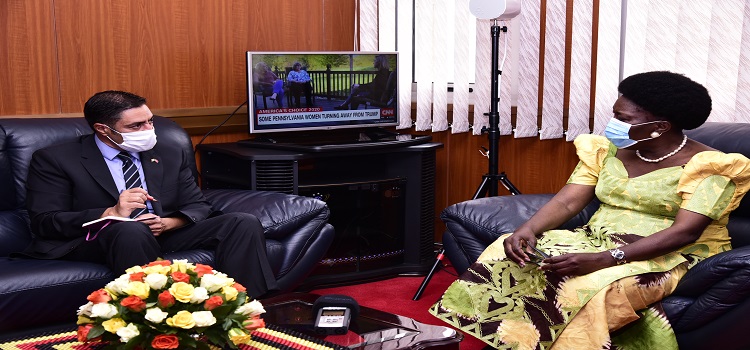
The Speaker of Parliament, Rebecca Kadaga calls for closer cooperation with the Turkish government for the development of the education sector.
Kadaga made the call during a meeting with the Turkish Ambassador to Uganda, H.E Fikret Kerem Alp. The ambassador paid a courtesy call on the Speaker on Tuesday, 13 October 2020.
Kadaga said there is need for these partnerships with the Turkish government through areas like provision of equipment to vocational schools.
She added that with the construction and facilitation of specialized training schools, the citizenry in places like Kamuli and Buyende would benefit.
“It is a request from my District khadi, Sheikh Ibrahim Muganza, who offered land where a training school for nurses could be established. This medical school would cover the areas of Kamuli and Buyende where there is demand for specialized training,” Kadaga said adding that, ‘their request is for support to establish, furnish it and give support for two to three years as they get on their feet,” she said.
The Speaker also noted the need for increased trade between the two countries with more exports to Turkey which she said would better the Ugandans involved in the trade.
“The rest of the economy has lost about eight months. Hotels are not working, other industries had to reduce the number of staff working. We also had difficulties at the borders with limitations of exports to Kenya, Tanzania and South Sudan. We need to look for more markets elsewhere so that we just don’t rely on the East African Community. With good opportunities, we could export to Turkey,” Kadaga said.
Kadaga with the Turkish Ambassador who paid a courtesy call on her
H.E Fikret Kerem Alp, said that trade is already taking place between the two countries.
“I have some good news; the Ugandan trade to Turkey has gone up to 10 per cent from what was exported last year. There is a great improvement in that and it means that we have found a good market in Uganda and vice versa,” Kerem said.
He added that the scholarships that were awarded this year were less than last year due to the pandemic which lead to closure of most universities.
“It’s true that the scholarships awarded this year were less than those of last year. The reason is basically that we are not sure how many universities or faculties will be opened for the students to study,’ he said adding that, ‘the good news is that despite the number being lower, 30 per cent of the scholarships are in medicine, engineering and agricultural irrigation. The quality improved even though the quantity reduced.’
